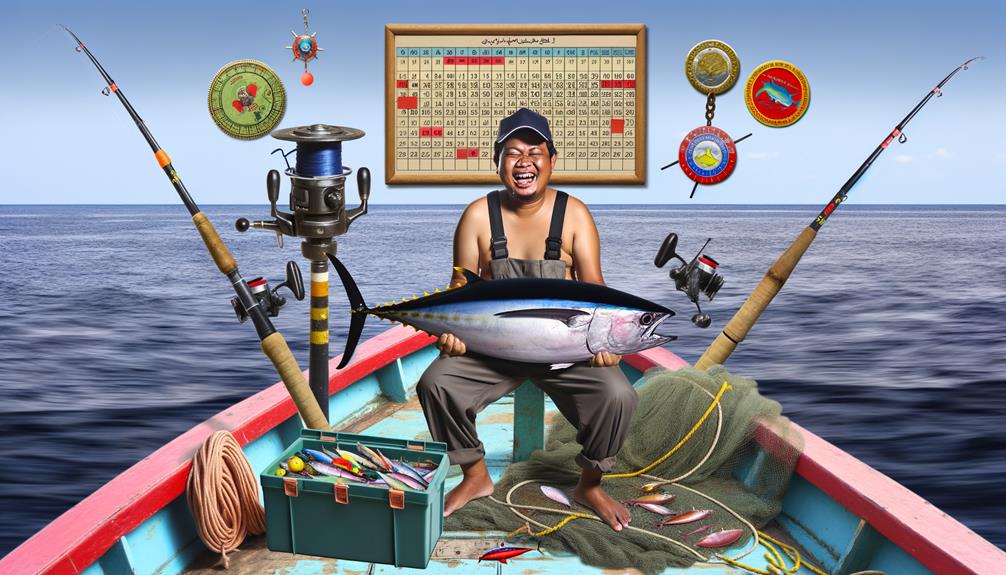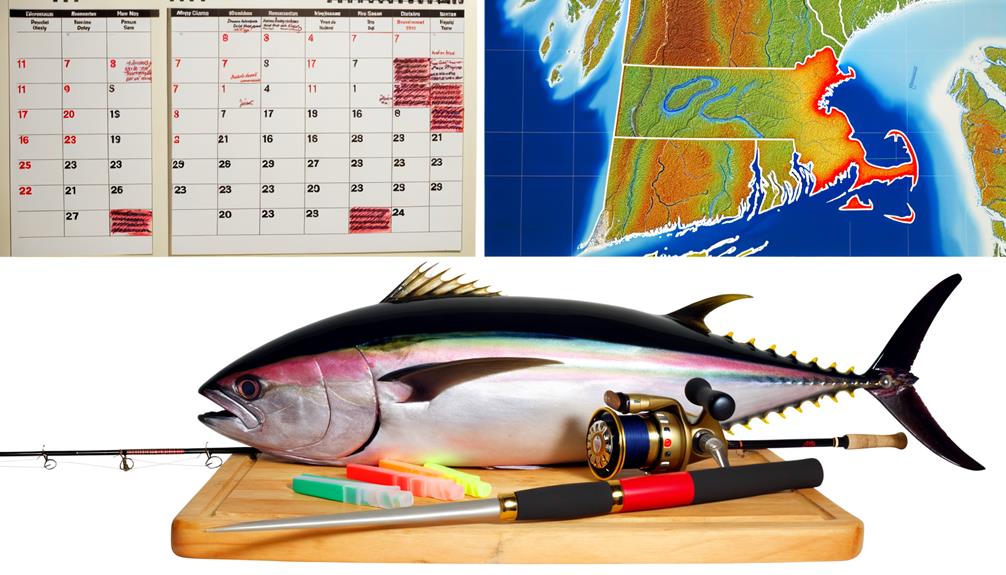Just as the ebb and flow of the tide is predictable yet full of unexpected surprises, so too is the tuna season in Massachusetts.
You're probably aware that each year, anglers eagerly anticipate the arrival of these formidable creatures, with the season typically kicking off in June and winding down in November.
But did you know that a variety of factors, from regulatory changes to environmental conditions, can influence the exact timing and length of the season?
If you're keen to understand the nuances of this cyclical phenomenon, you're in for a fascinating journey of discovery.
Stay tuned to unravel more about what influences the tuna season in Massachusetts.
Key Takeaways
- Tuna season in Massachusetts typically runs from June to November.
- Cape Cod in Southeast Massachusetts is a hotspot for Atlantic Bluefin Tuna.
- Regulations for tuna fishing vary from state to state and are enforced by NOAA.
- Climate can greatly affect tuna migration and behavior, potentially extending or shortening the season.
Understanding Massachusetts Tuna Season
If you're planning to venture into the waters of Massachusetts for bluefin tuna fishing, it's crucial to understand that the season typically runs from June to November, subject to specific regulations and varying conditions.
Southeast Massachusetts, particularly Cape Cod, is a hotspot for Atlantic Bluefin Tuna, offering anglers an unmatched fishing experience. However, the length of the bluefin tuna season isn't set in stone, as it's managed by the National Oceanic and Atmospheric Administration (NOAA). They announce specific dates annually, ensuring sustainable fishing practices.
Federal regulations, also managed by NOAA, dictate the bag limits for bluefin tuna fishing. These measures are essential in preserving the bluefin tuna population and maintaining a balance in the marine ecosystem.
Charter fishing experiences available in Massachusetts provide detailed information on departure times, return times, and available techniques, enhancing your bluefin tuna fishing adventure. To fully immerse in this community, you must adhere to these rules, contributing to the conservation of the Atlantic Bluefin Tuna species.
Peak Tuna Season in Massachusetts
You'll find that the peak tuna season in Massachusetts, particularly for the majestic bluefin tuna, typically rolls out from June through November, offering an unparalleled angling adventure especially in renowned spots like Cape Cod and Ipswich. These months mark the zenith of the tuna fishing season, with the bluefin tuna charter fleet in full swing, capitalizing on the migration patterns of the best bluefin tuna.
Analyzing the behavior of these magnificent creatures during the peak tuna season in Massachusetts, it's evident that the bluefin, in their quest for food, are drawn to the rich feeding grounds off the Massachusetts coast. This creates an ideal opportunity for both experienced anglers and novices to test their skills in an exciting, challenging, and fulfilling pursuit.
Understandably, the season's dates are subject to change, as they're managed by the National Oceanic and Atmospheric Administration (NOAA). NOAA oversees the bag limits for bluefin tuna, with specific regulations on fish size, vessel type, and region. It's imperative to follow these guidelines to ensure the sustainability of the bluefin population and to uphold the tradition of the tuna fishing season in Massachusetts.
You're part of a community that respects and values this majestic creature and the thrill of the chase it offers.
Regulations for Tuna Fishing

Navigating the intricate maze of tuna fishing regulations is critical, as these rules vary significantly from state to state, each one tailored to the specific tuna populations in their respective waters. In the United States, each state manages its tuna fishing season, which means there's no universal season. The regulations for tuna fishing are designed to ensure sustainable fishing practices and protect different tuna species.
Now, you might wonder, why one fish? Well, it's not about one individual fish, but rather the species of tuna that thrive in the waters of Massachusetts. The state-specific regulations, including catch limits, size restrictions, and seasonal closures, are all in place to safeguard these vital tuna populations.
As an angler, it's your responsibility to be aware of these regulations. Understanding when and where to fish for tuna, the permissible sizes, and the catch limits isn't just about adhering to the law. It's about belonging to a community that values and respects the balance of nature. So, before you cast your line, make sure you're well-versed in the rules.
After all, sustainable fishing ensures that future generations can enjoy the thrill of the catch just as you do.
Impact of Climate on Tuna Season
Understanding how climate impacts the tuna season isn't just about tracking shifts in weather patterns or water temperature; it's about adapting your fishing strategies and conservation efforts to these changes, which can greatly affect tuna migration and behavior.
In Massachusetts, the impact of climate on tuna season is significant. With warmer ocean temperatures, the season may extend, while colder waters could shorten it. This means that the specific days you're out fishing, even down to the precise 29 Fishing Days, can be influenced by these shifts.
During certain weather conditions, Pacific bluefin tuna can be found in abundance. However, their availability during the season is highly susceptible to changes in climate. For instance:
- Storms can disrupt their usual routes, making it harder for you to locate them.
- Changes in ocean currents can alter their behavior, affecting your ability to catch them.
- Unpredictable weather patterns can greatly influence their migration, impacting when and where they're found.
As a member of the fishing community, it's essential to be aware of these factors and to adapt your strategies accordingly. By doing so, you'll not only increase your catch but also contribute to the sustainable management of this valuable resource.
Preparing for Tuna Season

Armed with the knowledge of how climate can shape the tuna season, it's now crucial to turn your attention towards the preparatory aspects of the upcoming season for a fruitful fishing experience. You need to know specifics about Massachusetts' tuna population, size class, and regulations before setting off on day trips.
| What you need to know | Why it's important |
|---|---|
| Tuna Population | Understanding the tuna population will guide you on the best fishing spots |
| Size Class | This will help you ensure your catch is within the regulations |
| Fishing Techniques | Mastering techniques like trolling and jigging increases your chances of a successful catch |
| Regulations | Compliance with fishing regulations contributes to sustainable fishing practices |
Preparing for tuna season involves more than packing gear. It demands a scientific understanding of the fish and the environment. This includes everything you need: the best fishing techniques, knowing when and where the tuna are most abundant, and how to act responsibly to ensure the future of the sport. Your successful, sustainable fishing experience hinges on this knowledge. Welcome to the community of informed, responsible anglers.
Frequently Asked Questions
How Long Does Tuna Fishing Season Last?
You'll find tuna fishing season varies. Understanding tuna migration patterns, seasonal fishing impact, and sustainable practices is crucial. Remember, regulating tuna fishing ensures species diversity. Don't forget your fishing license requirements, they're important too.
How Long Is the Tuna Season in Gloucester Massachusetts?
In Gloucester, Massachusetts, you'll experience tuna season from June to November. It's crucial to follow Gloucester regulations, licensing requirements, and use proper tackling techniques for the diverse species to ensure seasonal profitability and proper boat preparations.
How Long Is Tuna Season in Cape Cod?
Ever wondered about the tuna season in Cape Cod? It generally runs from June to November, with peak fishing in July through September. It's vital for the local economy and affects the region's cuisine.
Can You Catch Tuna in Massachusetts?
Yes, you can catch various tuna varieties in Massachusetts. However, you'll need to know their bait preferences, obtain a fishing license, and follow Massachusetts regulations. Consider equipment recommendations for the local tuna population.
Conclusion
As the curtain falls on this exploration of Massachusetts's tuna season, remember that the rhythm of nature dictates this aquatic dance. Fishing for bluefin tuna isn't just a hobby, it's a testament to the intricate balance of our ecosystem.
So, whether you're preparing to cast your line or simply curious, it's crucial to respect NOAA's regulations and the role of climate change. Stay informed, stay adaptable, and let the ebb and flow of the season guide your journey.
